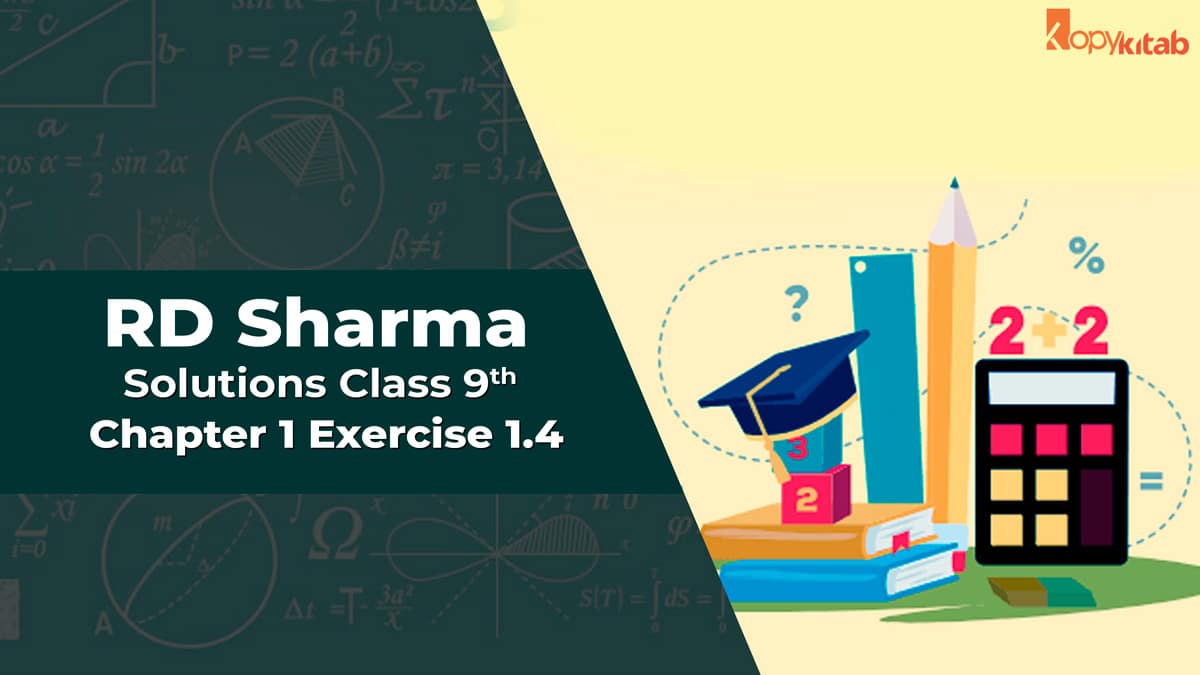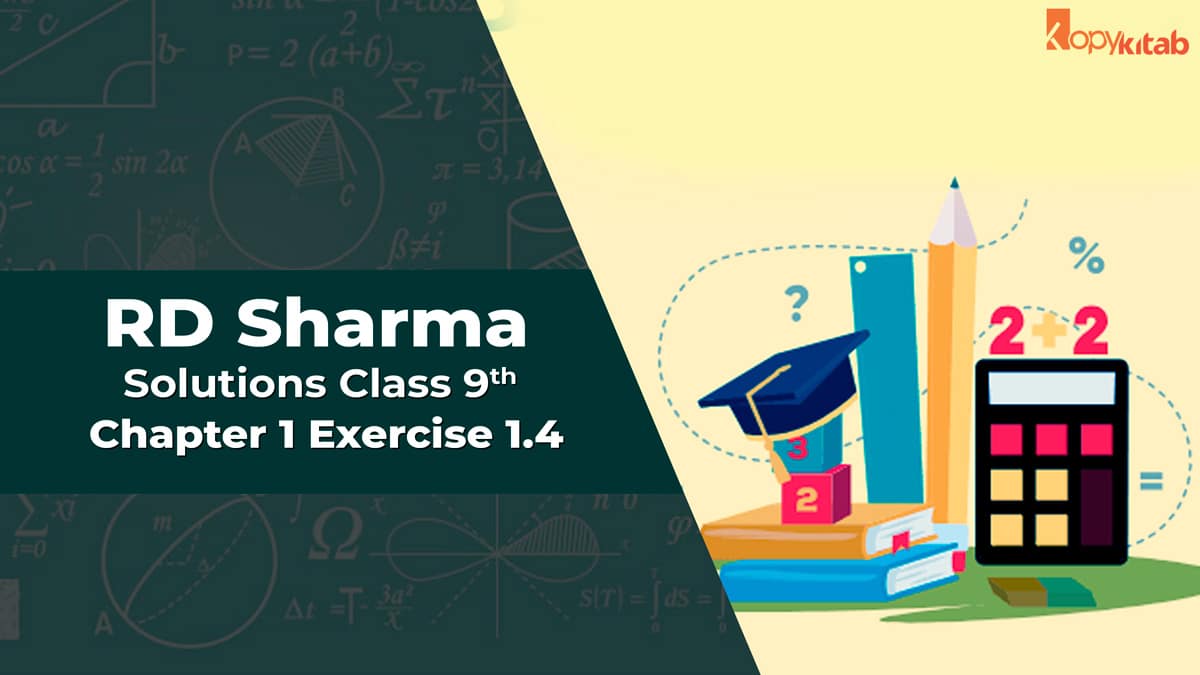
RD Sharma Class 9 Solutions Chapter 1 Exercise 1.4: When it comes to find a good help book one should always go for RD Sharma Solutions Class 9 Maths. It is because of many reasons like reliable and easy to understand solutions, solutions as per the current CBSE Syllabus and more. To now more about the RD Sharma Class 9 Solutions Chapter 1 Exercise 1.4, you must go through the whole blog.
Download RD Sharma Class 9 Solutions Chapter 1 Exercise 1.4
RD Sharma Class 9 Solutions Chapter 1 Exercise 1.4
Access answers of RD Sharma Class 9 Solutions Chapter 1 Exercise 1.4
RD Sharma Solutions Class 9 Chapter 1 Number System Ex 1.4
Question 1.
Define an irrational number.
Solution:
A number which cannot be expressed in the form of pq where p and q are integers and q ≠ 0 is called an irrational number.
Question 2.
Explain, how irrational numbers differ from rational numbers?
Solution:
A rational number can be expressed in either terminating decimal or non-terminating recurring decimals but an irrational number is expressed in non-terminating non-recurring decimals.
Question 3.
Examine, whether the following numbers are rational or irrational:
Solution:

Question 4.
Identify the following as rational or irrational numbers. Give the decimal representation of rational numbers:
Solution:

Question 5.
In the following equation, find which variables x, y, z etc. represent rational or irrational numbers:
Solution:

Question 6.
Given two rational numbers lying between 0.232332333233332… and 0.212112111211112.
Solution:
Two rational numbers lying between 0.232332333233332… and 0.212112111211112… will be 0.232 and 0.212
Question 7.
Give two rational numbers lying between 0.515115111511115… and 0.5353353335…
Solution:
Two rational numbers lying between 0.515115111511115… and 0.535335333533335… will be 0.515, 0.535
Question 8.
Find one irrational numbers between 0.2101 and 0.2222… = 0.2¯¯¯.
Solution:
One irrational number lying between 0.2101 and 0.2222… = 0.2¯¯¯ will be 2201.0010001…
Question 9.
Find a rational number and also an irrational number lying between the numbers, 0.3030030003… and 0.3010010001…
Solution:
Between two numbers 0.3030030003… and 0.3010010001…, a rational will be 0.301 and irrational number will be 0.3020020002…
Question 10.
Find three different irrational numbers between the rational numbers 57 and 911. [NCERT]
Solution:
Question 11.
Give an example of each, of two irrational numbers whose:
(i) difference is a rational number.
(ii) difference is an irrational number.
(iii) sum is a rational number.
(iv) sum is an irrational number.
(v) product is a rational number.
(vi) product is an irrational number.
(vii) quotient is a rational number.
(viii) quotient is an irrational number.
Solution:
(i) Two numbers whose difference is also a rational number, e.g. 2–√
, 2–√ which are irrational numbers.
∴ Difference = 2–√ – 2–√ = 0 which is also a rational number.
(ii) Two numbers whose difference is an irrational number.
e.g. 3–√ and 2–√ which are irrational numbers.
Now difference = 3–√ –2–√ which is also an irrational number.
(iii) Let two irrational numbers be 3–√ and –2–√ which are irrational numbers.
Now sum = 3–√ + (-3–√) = 3–√
– 3–√ = 0 Which is a rational number.
(iv) Let two numbers be 5–√ , 3–√ which are irrational numbers.
Now sum = 5–√ + 3–√ which is an irrational number.
(v) Let numbers be 3–√ +2–√and 3–√ –2–√which are irrational numbers.
Now product = (3–√ +2–√ ) (3–√ –2–√)
= 3-2 = 1 which is a rational number.
(vi) Let numbers be 3–√ and 5–√ , which are irrational number.
Now product = 3–√ x 5–√ = 3×5−−−−√
= 15−−√
which is an irrational number.
(vii) Let numbers be 6 2–√ and 2 2–√ which are irrational numbers.
Quotient =62√22√ = 3 which is a rational number.
(viii) Let numbers be 3–√and 5–√ which are irrational numbers.
Now quotient =3√5√ = 35−−√ which is an irrational number.
Question 12.
Find two irrational numbers between 0.5 and 0.55.
Solution:
Two irrational numbers between 0.5 and 0.55 will be 0.51010010001… and 52020020002…
Question 13.
Find two irrational numbers lying betwee 0.1 and 0.12.
Solution:
Two irrational numbers lying between 0.1 and 0.12 will be 0.1010010001… and 0.1020020002…
Question 14.
Prove that 3–√+5–√ is an irrational number.
Solution:

This is the complete blog of RD Sharma Class 9 Solutions Chapter 1 Exercise 1.4. To know more about the CBSE Class 9 Maths exams, ask in the comments.
FAQs on RD Sharma Class 9 Solutions Chapter 1 Exercise 1.4
How much does it cost to download the PDF of RD Sharma Class 9 Solutions Chapter 1 Exercise 1.4?
You can download it for free.
Can I access the RD Sharma Solutions Class 9 Maths Chapter 1 Exercise 1.4 PDF offline?
Once you have downloaded the PDF online, you can access it offline as well.
Are the solutions RD Sharma Solutions Class 9 Maths Chapter 1 Exercise 1.4 relevant?
The solutions are relevant as they are designed by the subject matter experts.
